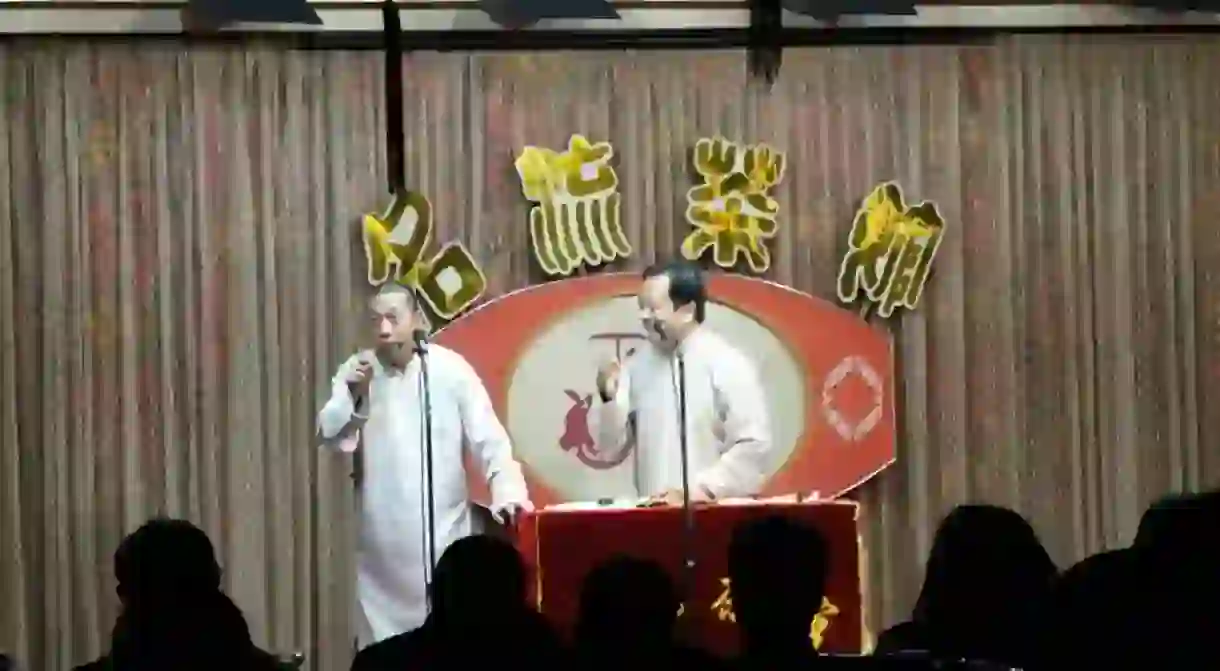11 Slang Words That Are Unique to Tianjin

Located next to Beijing, Tianjin features a dialect that is pretty much the same as the Northern Chinese Mandarin, except for its characteristic accent and some unique slang words. Tianjin is famous as the origin of Chinese cross talks, and even its slang seems to have a humorous tint. Check out the 11 slang words most representative of Tianjin below!
Friendly reminder: Some Pinyins below are not the official pronunciation of the characters. They are deliberately marked ‘wrongly’ to illustrate the Tianjin accent.
哏儿 Gén’er
Gen’er is Tianjin is like asking ‘how’s the weather’ in London – it’s one of the language’s most ubiquitous phrases. It translates to ‘funny’ and can either be used to describe a person or something funny that a person says. It’s difficult to find a Tianjin local who does not love cross talk – in fact, being funny is so essential in Tianjin culture that Tianjin’s nick name is 哏儿都 (Gen’er Du), or Funny Town.

嘛 Mà
Ma, meaning ‘what’, is another characteristic Tianjin-only word. It can basically replace ‘what’ in any phrase, and is different from 什么 shén me, or ‘what’ in Mandarin – Ma has a straightforwardness to it, indeed so straightforward that people who speak Tianjin dialect can be misunderstood as angry or rude (even though it’s actually the dialect to blame).
耐 Nài
Sometimes Tianjiners tend to add a n-sound in front of vowels. Nai is a typical case – it is in fact 爱 Ai (love) with an accent. There’s also a frequently used phrase 耐人儿 Nài Rén’er that means ‘cute’.
不觉闷 Bù Jiǎo Mèn
Literally meaning ‘do not understand’, Bu Jiao Men is used to mock those who are slow in observing the situation or other people’s mood.

拔创 Bá Chuàng
Ba Chuang means to break through difficulties to help a friend. It is usually used to describe friendship between two good buddies.
贫气 Pín Qi
While Gen’er is more often used positively to portray a funny talk or a person, Pin Qi is used in a comparatively negative way, to jeer at those who tries too hard to impress others with actions or speech that nobody other than themselves finds funny. If you want to compliment a Tianjiner’s humor, remember to use Gen’er instead of Pin Qi.
煎饼果子Jiàn Bing Guǒ Zi
One of the most important words in the Tianjin lexicon, Jian Bing Guo Zi, also known as Tianjin Crêpe, is a nationally famous signature breakfast snack. In fact, Tianjiners’ love for Jian Bing Guo Zi is so keen that they can be very pedantic regarding what constitutes an authentic Tianjin Jian Bing Guo Zi: the crêpe must be made of mung bean and the filling must be a fried bread stick (which is Guo Zi in Tianjin dialect and You Tiao in Mandarin) or a bread cracker (which in Tianjin dialect is Guo Bi’er) and should be nothing else. Tianjiners can never stand the putting of ham or cabbage in a Jian Bing Guo Zi.
https://www.instagram.com/p/Bhyq3yNhsxt/?tagged=%E7%85%8E%E9%A5%BC%E6%9E%9C%E5%AD%90
幺蛾子 Yāo É Zi
Yao E Zi, which literally means ‘strange moth’, actually translates to ‘lousy idea’. It is often used following 出 Chu, which together means ‘to have a lousy idea’. The word is now widely used by people from other parts of China, too.
鬊鸟 Shún Niǎo
Nearly all kids who grow up in Tianjin have had the experience of being called Shun Niao by their mothers. The slang word is actually a negative term that literally means ‘ugly bird’, but more colloquially translates to ‘you naughty boy/girl!’ – a hilarious phrase that will leave you not knowing whether to laugh or cry.

崴泥 Wǎi Ní
Wai Ni literally means ‘feet stuck in the mud’, and is usually said 崴泥了 Wai Ni Le with an exclamation mark following it, which is pretty much the same as ‘Oops! Something bad just happened!’ in English.
不够揍儿 Bú Gòu Zòu’er
Bu Gou Zou’er is the opposite of Ba Chuang, or ‘loyal to friends’, and is something that most Tianjiners would hate to be called. It can also be abbreviated down to 不够 Bu Gou. If they wanted to criticise someone who did something unkind, Tianjiners usually say 这个人太不够揍儿/不够了 Zhe Ge Ren Tai Bu Gou (Zou’er) Le – ‘this guy is really mean!’.













